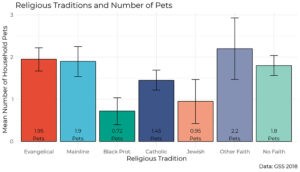Cat owners, brace yourselves: research shows dogs are by far the most popular household pet in America – 75 percent to 40 percent, respectively.

Ryan Burge, his youngest son and Lucy.
And if you’re a church-going cat owner, hold on even tighter: feline lovers attend services less frequently than K-9 folks do.
Shocking as they may be, the findings are presented by social scientists Ryan Burge (also an American Baptist minister) and Samuel Perry.
Their paper, “How Religion Predicts Pet Ownership in the United States,” was published last month in the Journal for the Scientific Study of Religion.
They cross referenced statistics on religious identification and practice with pet ownership data from the 2018 General Social Survey. Some of it will likely have cat owners hissing.
“Most notably, we find a strong, negative association between worship attendance and cat ownership,” the duo said in the abstract of their paper.
But the paper isn’t an expose on cats. Instead, Burge and Perry explore where religious belief and practice (or none at all) overlap with pet ownership (or none at all) in the U.S.
Their data factors in denominational identification, generation, attendance and geographical setting.
While the kinds of animals preferred by members of different traditions is presented, so is a picture of an increasingly alienated American society.

“Religious Traditions and Number of Pets” Graphic/Ryan Burge.
“As our culture becomes more isolated, our pets become even more important to us,” Burge told Baptist News Global.
The dynamic becomes more common as fewer Americans have children, said Burge, an assistant professor of political science at Eastern Illinois University.
“Pets then become like a proxy.”
Burge spoke with BNG about his and Perry’s research, and about his Baptist faith and dog Lucy. His comments are presented here, edited for clarity.
Some articles suggest you make a connection between cat ownership and atheism. Have you gotten any hate mail from cat owners?
No. I haven’t. The criticism we usually get is more about methodology. And our paper doesn’t say atheists own cats more. It says people who don’t go to church are more likely to have cats.
You’re an American Baptist pastor. Do you lead a church?
I started as a youth pastor when I was an undergraduate. When I made the transition to graduate school, I needed a part-time job and I became the senior pastor of a little church of about 30 people when I was 23 years old. In 2006, I started pastoring First Baptist Church of Mount Vernon, Illinois. We actually had a budget meeting last night (Jan. 8).
Did you grow up Baptist?
I grew up Southern Baptist at First Baptist of Salem, Illinois. I was very active in the church.
How did you become American Baptist?
I went to a Christian college – a Free Methodist school. In one of my classes, philosophy of youth ministry, the prof asked if any of us were interested in being a youth minster in a community which was 20 miles from where I grew up. So, I applied and I was offered the job. I didn’t even know what an American Baptist was at the time. But I knew it was a Baptist church. I was 20 years old and a three-month thing became a three-year thing.
Please share about your dog, Lucy.
She’s 10 years old. She’s 7 pounds. She’s a Yorkshire terrier. She’s been with us through the birth of our two kids. We consider her our first kid. She is actually lying next to me right now. She is my constant companion. I love dogs. I love animals, generally.
Do the findings of your study jive with the people and experiences in your life?
I think so. Anecdotes are always tough, but it does seem to be true that the more social you are – the more religiously active you are – the more likely you are to own a dog.
What is it about dogs?
There are dog parks. There are no cat parks. Dogs force you to be more social. Lucy has helped me to get to know my neighbors. With cats, you can leave that cat in house, and live in that house for years, and no one may ever see you. We choose our animals largely on how they complement our social orientation.
What is the General Social Survey?
The GSS, we call it the gold standard in social science, especially in the sociology of religion, which is what I do. The survey is done by the National Opinion Research Council every other year, which has conducted it since 1972. They ask all kinds of questions about all kinds of behaviors, including changes in church attendance or racial composition or partisan affiliations. But they will add a bloc of questions about something weird or unusual, and in 2018 they added a bloc of questions about pets and pet ownership. It’s very interesting because there is hardly any literature out there on religion and pets.
Why do evangelical and mainline Protestant households tend to have the most pets?
That’s tough. Part of me wants to say that Christianity is still very strong in rural areas and in small towns where it is easier to have pets. The unaffiliated live in urban areas where it’s harder to own pets. Stable families and home ownership also ties this together. Evangelicals are more family oriented than the unaffiliated, who tend to be younger and moving around a lot. They are less likely to have pets.
Why would Catholics, black Protestants and Jewish people have fewer pets, on average?
That’s a hard one, too. With black Protestants, a lot of families have lower incomes and a lower income is not conducive to having pets. Pet ownership is expensive. The Catholic part is kind of weird. White or non-white, rural or suburban. I can’t really figure out the Catholic piece.
Why are evangelicals more likely to have dogs than mainline Protestants?
Mainliners are older than evangelicals, as a rule – over 60 years old. Owning dogs is hard work if you are older. It takes a lot more physical ability. Dogs don’t have that attraction for older people. Cats, usually, are smaller and are easier to care for. Also, a lot of retired people are traveling, which can make having a dog more challenging.
Does that suggest why higher rates of church attendance correlate with lower rates of pet ownership overall?
It’s a time thing. It’s not a theological thing. You just don’t have time to take care of a bunch of animals if you are at church all the time. And if you are at church more often, then you are more likely to be socially active.
What’s your overall takeaway?
It speaks to the larger idea that cats and dogs and other animals have become replacements for interacting with people. These trends go along with the epidemics of depression, addiction and loneliness that are nibbling along the edges of our culture.
